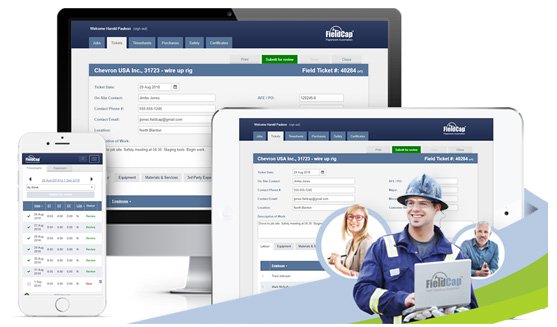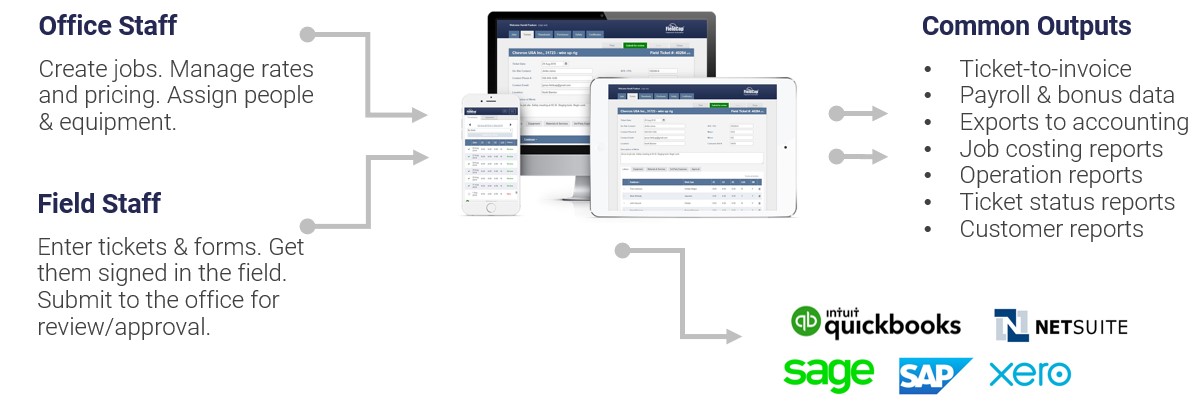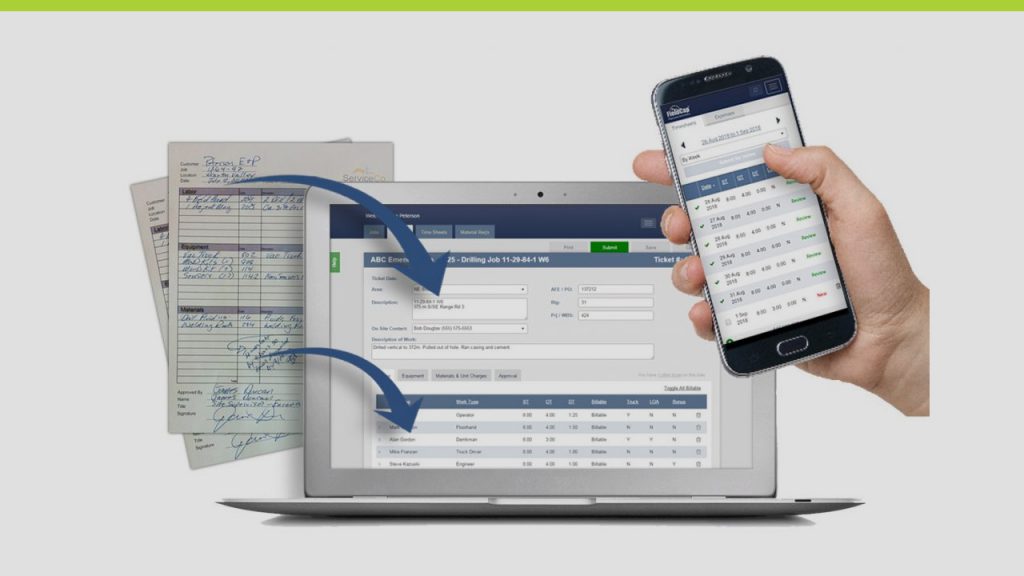Oilfield Field Ticketing Software 101 – The Basics
What does it do exactly?
Field ticketing software (or electronic or digital field ticketing) has one main purpose: to allow oilfield service companies to use electronic devices and the internet to complete and process field tickets so they don’t have to rely on paper forms, spreadsheets and emails to get that data back to the office and processed properly.
- Get Organized – Electronic tickets are stored in the cloud connected to jobs and customers with all the related data and attachments.
- Improve Efficiency – Electronic tickets are easy to create and available for review and processing in real time. Enter data once and feed it to people and systems that need it.
- Improve Accuracy – Less handwriting and typing reduces costly errors and requires less manual review and oversight.
By replacing handwriting with clicking or typing, users of field ticket software reduce costly errors, eliminate the need to constantly review everything and re-type the same information into multiple different systems, and automate time-consuming tasks like reporting.
What are field tickets?
The term field ticket is most often used to describe LEM sheets (Labor, equipment and materials) that are primarily used to track the items that will be invoiced to the customer so that they can be reviewed and approved by a customer representative on the job site. This ensures that when the invoice reaches the A/P department at the customers office it will get paid and coded appropriately because what you are invoicing matches what their field representative signed off on.
That said, the term field ticket is also used generically to describe other data capture forms that are used in the field.

This is just a handful of the more common types of tickets. There are many others and thousands of variations. Oilfield companies have unique data needs that support their operations, customer and reporting.
Different types of field tickets in the oilfield include:
- LEM Sheets for billing
- Time Sheets for payroll
- Expenses
- 3rd Party Charges
- Run/Equipment Usage
- Inspection forms
- Maintenance
- Work Orders
- Safety Forms
- Compliance forms
- Check lists
Examples of oilfield services that use field ticket software:
- Oilfield Construction
- Lease Construction
- Pipelines
- Well Services
- Wireline
- Facilities
- Inspections & Tests
- Repair & Maintenance
- Equipment Rentals
- Environmental
- Trucking & Hauling
- Drilling & MWD
- Abandonment
- Waste Management
- Engineering
- Fracturing
- Casing & Tubing
- Containment
- Camps
- Fluid Management
Who are the main users?
The main users are the workers in the field because they are collecting the data used for billing and reporting. But it is just as important to the office support staff and management who rely on that data and save time processing it and preparing reports.
- Field Workers
- Field Crews
- Field Supervisors
- Office Administrators
- Accounting Staff
- Payroll Admin
- Management
- Owners & Execs

How do field ticketing systems work?
Field ticketing software works by replicating an oilfield company’s field tickets and forms with online versions that can be accessed via the internet from electronic devices such as phones, tablets and personal computers. When the company is hired to do some work a new job is created in the system, rates and prices are assigned, and people and equipment are assigned as well. The system will assign a unique job number to that ticket that will automatically be connected to every ticket or form that is created and saved as part of that job.
With an electronic system, workers select each line item on tickets and other forms from pre-populated drop-down menus. This simple change eliminates errors cause by messy hand-writing or incorrect calculations because the system automatically does that for them. It also connects the office and the field with accurate, real-time data in a way that paper and spreadsheets cannot.
Jobs – Jobs get activated in the office. Then workers, equipment, rates & pricing are assigned.
Tickets – Ticket, time sheets, safety and other forms get completed in the field and instantly become available to the office for processing.
Billing – Approved tickets are easily combined into invoices. System data is used for billing, payroll, bonuses and other accounting and financial needs.
Reports – System data is used in the field and the office to easily create or automate reports for internal use and for customers.
Accuracy In = Accuracy Out

What are the main benefits?
Field ticketing software can be used to streamline many different business functions. At a minimum it is generally used to create and track jobs, manage and process tickets, generate reports and export to other systems like accounting.
- Job scheduling and tracking
- Managing and processing tickets
- Tracking people and equipment
- Tacking safety and compliance
- Exporting to payroll and accounting
- Generating reports
- Onboarding
What problems does it solve?
There is a reason many of the most successful oilfield service companies today have software in place for tracking jobs & tickets. It is quickly becoming a must-have rather than a nice-to-have.
Your customers want speed, efficiency and accuracy and in order to make that happen you need software to help you solve the biggest problems.
- Lost, late or inaccurate tickets
- Inefficient manual reviews & oversight
- Double-entry of the same information
- Billing delays and rejected invoices
- Missed charges & incorrect pricing
- Re-typing into other systems
- Time-consuming reporting
- Email overload & clunky shared folders

- Easily create tickets
- Any location or device
- Less data entry & errors
- Easy customer approvals
- Send to office in real time

- Keep jobs & tickets organized
- Get accurate field data
- Less data review & re-entry
- Convert tickets to invoices
- Easily create reports

- Know where people are
- Know where equipment is
- Know how jobs are doing
- Know where your costs are
- Grow efficiently
How can I ensure that it is successful?
Here are some tips that can help ensure you get off on the right foot and realize all the benefits sooner.
Have Clear Objectives
Do some work ahead of time to really clarify which problems are costing you the most time and money or hindering your growth. Rank them in order and park the rest for later.
Choose The Right Vendor
In the beginning don’t get too hung up on features and technical stuff. Find a software company that gets you and feels right and trust their process. Make sure they have lots of testimonials and references from similar customers and let them show you the way.
Keep It Simple
Don’t fall into the trap of trying to solve every problem all in one go. Use the 80/20 rule. If field tickets are your big problem, start there and add requirements sparingly. The less you attempt at the start the easier it will be for your team to get the big wins early.
Keep Your Leadership Involved
The biggest threat to your success will be idea overload (complexity). Saying no will be critical to remaining focused on your objectives. Make sure senior leaders stay involved all the way through so they can say no at the right times and keep things simple.
Commit 100%
Once you say go, go for real. Get to the benefits as fast as possible and empower your team to make it happen. Make sure the right members of your team will be available to work with your chosen vendor regardless of how busy things get on your end. It’s important so treat as such.
Burn The Boats
If you can avoid it, don’t bother with any pilot projects or “soft launches”. All those do is give people excuses to go halfway and point fingers. The most successful companies just pull the plug and go. Bumps are inevitable but these companies remain focused on moving forward and get to the promised land faster and cheaper.
How much does field ticketing software cost?
Field ticketing software is generally priced the same way that most modern software is. There is a fee that is charged at the beginning to cover the costs of getting it all set up, training people and helping you transition. After that there is a monthly License Fee for the ongoing usage of the software.


